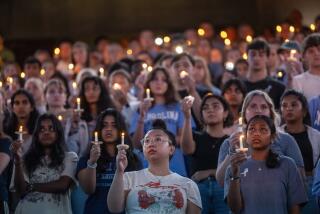Drinking on Campus Not Slowed by Law
- Share via
BOSTON — Raising the drinking age to 21 does not appear to curtail college students’ alcohol intake, researchers reported Monday.
Jerry Lotterhos and his colleagues at East Carolina University in Greenville, N.C., studied effects of North Carolina’s 1986 increase in its drinking age by surveying East Carolina students before and after the change.
Lotterhos, who reported his findings at a meeting of the American Public Health Assn., surveyed 390 undergraduates in 1986, 300 in 1987 and 346 in 1988.
Although the percentage of students who reported drinking daily dropped from 13% in 1986 to 9% in the next two years, the percentage of students who reported they drank remained 90% all three years, Lotterhos said.
Same Percentage Drink
“In general, the North Carolina 21-year drinking age law is not stopping alcohol use in the university student population,” Lotterhos concluded. “The same percentage of drinkers are present in the two years after the law was enacted as in the previous year.”
Students said they resorted to using false identification and getting older people to buy alcohol for them after the change.
“The biggest change is that students are changing their locations for consumption to more underground, clandestine situations,” Lotterhos said. “It is possible that consumption in these private contexts, without the sanctions and controls of the public bar, may actually result in more serious problems.”
Before the law change, a quarter of students listed the bar as their primary location for drinking. In 1987, this had dropped to 6% and in 1988 only 1.4% said the bar was their primary location.
Private or clandestine drinking contexts were listed by 57% of students in 1986, 83% in 1987 and 83% in 1988.
‘Distancing’ May Hurt
“This ‘distancing’ from authority may also result in persons in this age group finding it more difficult to reach out for assistance if they are in trouble with alcohol,” he said.
“Clandestine alcohol use may result in an increase in overall negative consequences rather than a decrease. For example, the increase in ‘sexual activity later regretted’ could be associated with such private context use.”
The percentage of students who reported they had “engaged in sexual activity which I later regretted or felt I would not have done had I not been drinking” rose from 70% in 1986 to 72% in 1988.
On the positive side, there was no significant increase in the use of other drugs, as some had feared, Lotterhos said. In fact, drug use appeared to decrease.
More to Read
Sign up for Essential California
The most important California stories and recommendations in your inbox every morning.
You may occasionally receive promotional content from the Los Angeles Times.










